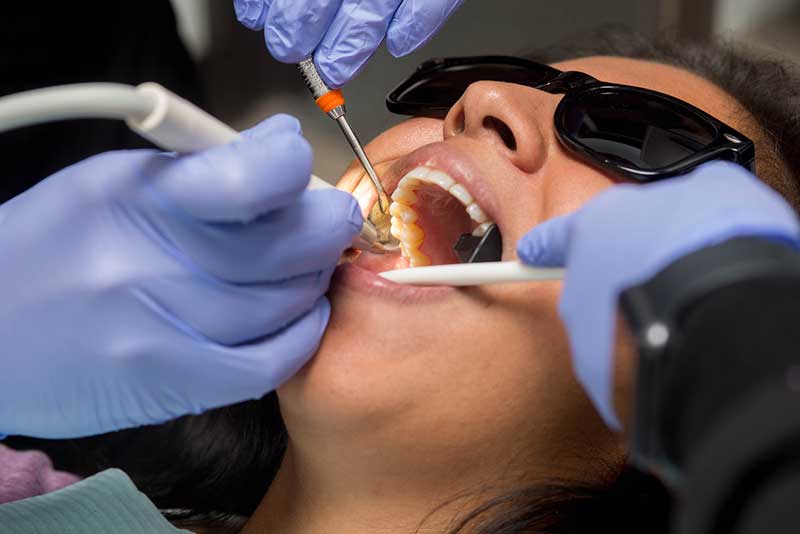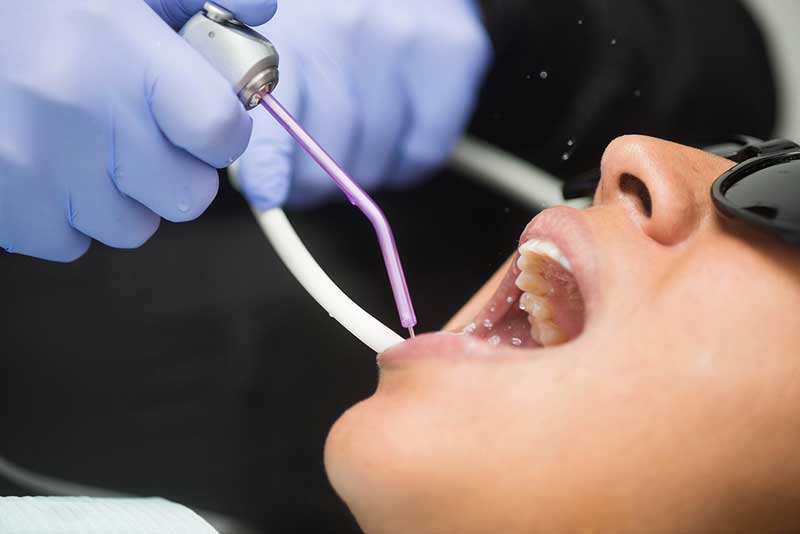Gingivitis
Healthy gums are a sign of strong oral health and improve your overall smile, making you more approachable and confident. However, if you’re suffering from persistent bad breath, sensitive gums that bleed while brushing, or swollen gums, you may suffer from gingivitis, a common but dangerous gum disease. If you see any signs of gingivitis, you should consult URBN Dental in Midtown or Uptown Houston gingivitis treatment dentist and set up an appointment immediately.
What is Gingivitis?
Gingivitis is the earliest stage of gum disease, leading to inflammation of the gums. This disease usually occurs because of the unchecked accumulation of plaque and tartar along your gum line, leading to bacterial decay. If left untreated, gingivitis can progress further and infect the bones underneath the gums, leading to a dangerous condition called periodontitis. Poor dental hygiene is the most frequent cause of gingivitis. Gingivitis can be prevented and treated with good oral hygiene practices, including brushing at least twice daily, flossing once daily, and scheduling routine dental exams.

What Causes Gingivitis?
Proper oral hygiene doesn’t just consist of regularly brushing and flossing your teeth. It also includes regular dental cleaning appointments so your dentist can scrape off remnants of food particles and plaque that you can’t reach yourself. If you don’t follow proper oral hygiene habits — including regular dental visits — you are likely to suffer from gingivitis. As more food particles get stuck between your teeth, you start developing plaque, which is a sticky layer that invites bacterial growth. Plaque eventually turns to tartar, which is hard to remove with simple brushing. Tartar irritates the gumline, makes it more difficult to remove plaque, and acts as a barrier for bacteria. Tartar removal needs a dental cleaning by a professional. As such, poor oral hygiene leads to plaque and tartar accumulation, which leads to bacterial decay, which leads to gingivitis.
Gingivitis Symptoms
Gingivitis is a very common dental problem and anyone can develop it. There are a number of warning signs of gingivitis that you should look out for:
- The primary initial signs of gingivitis is swollen and red gums caused by inflammation.
- Your gums also become extremely sensitive and they start bleeding when you brush your teeth.
- Your teeth seem larger because your gums start receding.
- You suffer from persistent bad breath regardless of how much you brush your teeth or use mouthwash.
- Some of your teeth may become loose and shaky because of the receding gum line.
- Exposure of the dentin part of the teeth due to gum recession makes your teeth extremely sensitive.
Gingivitis Treatment
The moment you notice any signs of gingivitis — swollen gums, red gums, bleeding gums, sensitive teeth — you need to contact your Gingivitis Treatment dentist immediately. Untreated gingivitis can develop into periodontitis, a far more dangerous illness resulting in tooth loss. Periodontitis is gum disease that extends to underlying tissue and bone. Chronic gingival inflammation has been linked to various systemic illnesses, including rheumatoid arthritis, diabetes, coronary artery disease, stroke, and respiratory illness. The dentist will run a series of clinical examinations to understand the source of your gingivitis symptoms and they’ll also examine your gum health. Following that, they may run some x-ray scans to detect anomalies in your bone, teeth, or jaws. Once the preliminary examination is complete, the dentist will curate a treatment plan suited for your needs.
Gingivitis can be treated with a deep dental treatment comprising of two procedures — scaling and root planing. During the scaling procedure, the dental hygienist will scrape off all traces of your plaque and tartar, even from the gums. The root planing procedure will only be necessary if the gum disease has spread to the bones as well. During this procedure, the dental hygienist or gingivitis dental treatment dentist will smoother the root of your teeth so that it can be reattached to the gums.
Following the root planing treatment, the dentist will carry out a few aftercare steps to get rid of all bacterial infection. This will start by simply examining your mouth for remaining traces of plaque and tartar. That will be followed by a thorough brushing session using an abrasive toothpaste. Following that, the dentist will thoroughly floss your teeth and then you’ll have to rinse your mouth with a fluoride solution. Finally, the dentist will apply a fluoride gel to your teeth and make you wear a mouthpiece in order to stave off bacterial decay for the coming months.
What Happens if I Don’t Treat Gingivitis?
Gingivitis is a rapidly progressing disease. If you don’t treat gingivitis promptly, the infection will spread to the bones under your gums. This is known as periodontitis, and it leads to bone loss and decay. If allowed to continue, a situation will arise in which you may lose your teeth entirely. The infection may also spread to other surrounding teeth and put them at risk. If you don’t treat gingivitis at the initial stages, you may have to go for intensive procedures like a root canal or dental extraction later.

How to Prevent Gingivitis?
One of the best way to prevent gingivitis is to follow consistent oral hygiene practices. The following are some tips on how to prevent gingivitis altogether.
- Brush your teeth at least twice a day. You should ideally use an electric toothbrush and an abrasive dentist-recommended toothpaste.
- Floss your teeth after every meal so that you can remove every trace of food particles from between your teeth.
- Use dentist-recommended antibacterial mouthwash to rinse your mouth every day. This will prevent bacterial decay.
- Go for regular dental cleaning appointments every 3 to 6 months. During these sessions, the dentist will thoroughly examine your teeth and get rid of all accumulated plaque and tartar, thus preventing the chance of getting gum disease.
- If the dentist states that you have some disease and you need treatment, heed their advice. If you allow gum diseases to fester, they can become dangerous and may lead to bone and tooth loss.
- Candies and sweets invite bacteria, so limit your sweet consumption.
- Stop tobacco consumption as it drastically increases the risk of gingivitis and numerous other diseases.




